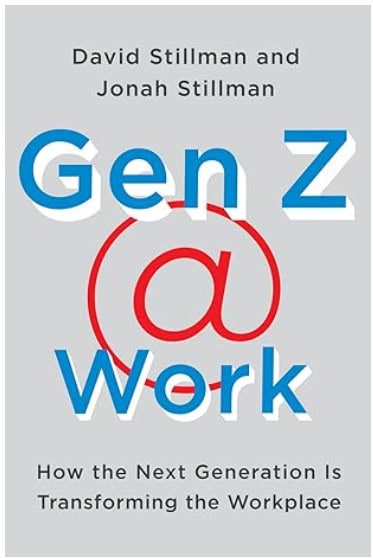Book: Gen Z at Work
By: David Stillman and Jonah Stillman
Reviewed by: Ashley Michael
The Premise: Gen Z @ Work: How the Next Generation is Transforming the Workplace by David and Jonah Stillman is all about cracking the code on Generation Z. The book’s main goal is to help leaders, managers, and anyone working with Gen Z understand what makes them tick and how to get the best out of them. With David, a Gen X, and Jonah, who’s part of Gen Z, you get insights from both sides of the generational gap, making the book a well-rounded guide.
The Stillmans break down Gen Z into “Seven Key Traits,” each unpacked with stories, research, and practical tips. Whether it’s understanding the “Phigital” world where physical and digital blend seamlessly or the “Hyper-Custom” need for personalized experiences, the book offers a solid blueprint for how to connect with and motivate Gen Z. By the end, you’ll have a better handle on what drives this generation and how to make them thrive in your workplace.
The Bottomline: As a Millennial, who is hearing from other Millennial and Gen X leaders that they’re struggling with the generational differences, I really liked this book. It nudges you to rethink your leadership style—moving away from the traditional, top-down approach and embracing a more flexible, collaborative vibe that Gen Z appreciates. We are all so stuck in our biases about how people should BE at work and I liked that it highlighted how it would be better to understand why the are the way they are, instead of trying to force them to conform to how things have always been done.
Three big takeaways I had was that Gen Z have a love for all things digital, they crave authenticity, and they need quick feedback.
As I was reading, I was thinking about how this generation isn’t as mystifying as they’ve been made out to be and that with a slight reframe we can not only coexist, but bring out the best in them to help where Millennials and Gen X may lack.
Gen Z are entrepreneurial, pragmatic, and eager to be part of something meaningful. If you, as a leader, can tap into these traits you’ll find they bring a lot of energy and fresh ideas to the table.
This book offers a good mix of insights and practical advice, though some of the points can feel a bit broad. Still, it’s a solid starting point if you want to get a grip on how to work most effectively with Gen Z colleagues or direct reports.
Recommendation: I’d recommend this book for anyone working with Gen Z in the workplace (leaders, managers, colleagues, HR professionals) who want to better connect with and support them. Our biases are powerful. The first step to overcoming our own biases is to recognize that we have them, and understand what they are, then actively seek out diverse perspectives, which this book provides.




